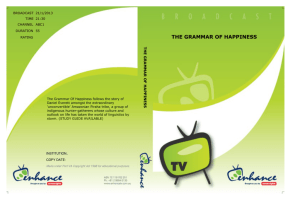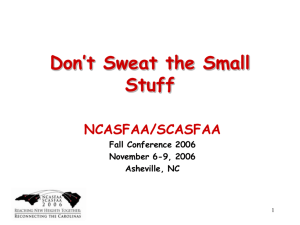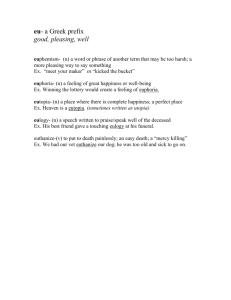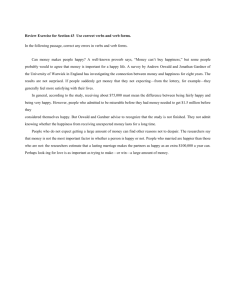Knut Ims Well-being and Happiness corrected
advertisement
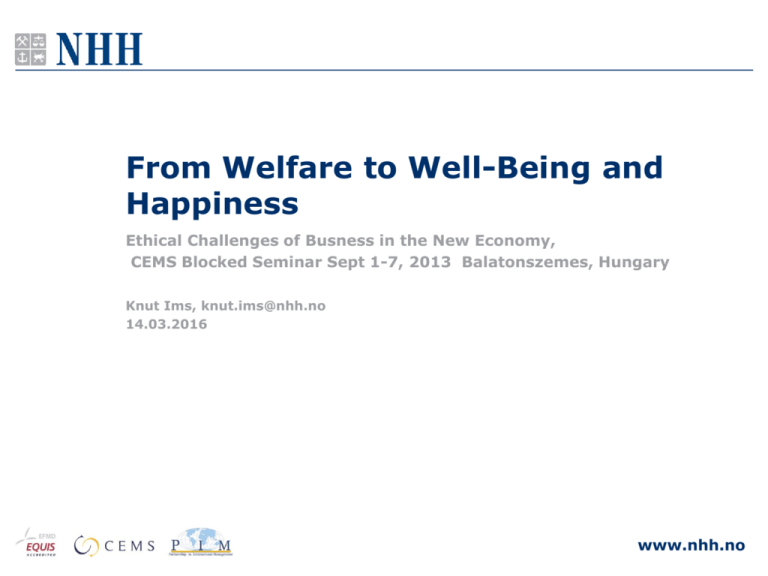
From Welfare to Well-Being and Happiness Ethical Challenges of Busness in the New Economy, CEMS Blocked Seminar Sept 1-7, 2013 Balatonszemes, Hungary Knut Ims, knut.ims@nhh.no 14.03.2016 www.nhh.no Agenda • What leads to happiness? –The happiness hypothesis/positive psychology –The virtue hypothesis • A knowledge-oriented perspective on ethical behavior –Happiness and ethical behavior –Group work –Eudaimonia Income and happiness Satisfraction •More is not better! •Mass affluence and overabundance of choice has lead to ”Affluenzia”: –Children: highest levels of anxiety –Increases in rates of crime and divorce –Rates of alcoholism, suicide, and depression have increased dramatically - Once basic needs are met, money cannot buy additional happiness. - Replace welfare (GDP) with Human Development Index (HDI)or more radically with Gross National Happiness index (GNH) as in Bhutan? Bhutan 14.03.2016 5 Gross National Happiness (GNH): Bhutan as an example • Happiness = Wealth/desire • GNH’s four pillars: 1.Promotion of sustainable development, 2.Preservation and promotion of cultural values, 3.Conservation of the natural environment, and 4.Establishment of good governance. 14.03.2016 6 Assessing Happiness: UK - 2011 • Office for National Statistics (200.000 questionnaires) 1.Overall, how satisfied are you with your life nowadays? 2.Overall, how happy did you feel yesterday? 3.Overall, how anxious did you feel yesterday? 4.Overall, to what extent do you feel the things you do in your life are worthwhile? • Happiness can be measured using the day reconstruction method, which consists in recollecting memories of the previous working day by writing a short diary (Daniel Kahneman) • The Affect Balance Scale asks people to report how frequently they have experienced various positive and negative emotions over the last 30 days • The Experience Sampling method uses a pager to occasionally interrupt people’s waking experience and to sample their moods. 14.03.2016 7 Positive Psychology • Martin Seligman • Mihaly Csikszentmihaly • From the disease model to flourishing. – From focusing exclusively on the miserable/weaknesses to including how to build human strengths • What is happiness? • PERMA (Positive emotions, human relationship, meaning and accomplishement) 1)The Pleasureable life 2)The Good life 3)The Meaningful life 14.03.2016 8 What leads to happiness? INCOME HAPPINESS ? HAPPINESS ? INCOME HAPPINESS Happiness hypothesis • The Positive Psychology Hypothesis: – H (Happiness) = S (biological set point) plus C (conditions) plus V (voluntary activities), plus VE (vital engagement) – H = S + C + V + VE – C assumes people are ultrasocial creatures (needs friends, strong conncetions and dependable relationship. Love and work are like water and sunshine for plants. – V involves finding ”flow” (activities/tasks you are immersed into) – Vital Engagement (a relationship to the world characterized by experiences of flow and meaning (subjective significance) – a felt connection between self and environment – You cannot reach happiness directly, it only comes as a byproduct. - J. Haidt (2006) The Happiness Hypothesis, Arrow Books FLOW: BEYOND BOREDOM AND ANXIETY •CHALLENGES » ANXIETY » FLOW » BOREDOM SKILLS/CAPABILITIES 14.03.2016 11 The pursuit of happiness • The progress principle: – ”Things won are done; joy’s soul lies in the doing” (Shakespeare) – Pleasure: making progress toward goals vs. achieving goals. • The Adaptation principle: – The mind is more sensitive to changes than to absolute levels. • Nerve cells respond vigourously to new stimuli, but gradually they ”habituate”. – Lottery winners adapt soon to the new baseline of daily life. – We are stuck on the”hedonic treadmill” (also noted by A Smith in 1759). – We accumulate riches in life - raise our expectations, and continue to strive 14.03.2016 13 The pursuit of happiness • Pleasures: delights that have clear sensory and strong emotional components (food, sex etc) , • Must be ”spaced” and varied; overdoses can lead to disgust. • GRATIFICATION: actvities that engage fully, can lead to flow. • Make us extend ourselves; self-transendence/transformational; ”the feeling wells up inside until it spills over” • Gratitude is Acknowledging of goodness in one’s life and Recognizing the source(s) of this goodness – the object of gratitude is other-directed (Heidegger: ”Denken ist Danken”). • The virtue of gratitude is «the mothers of all virtues». • Gratitude implies humility and is promoting positive relations. • The capacity for joy can and must be trained: Ex.; Keep a Gratitude Journal, spend more times with grateful persons, watch your language!, smiling itself produces feelings of happiness Happiness hypothesis • Misguided pursuits - Conspicuous consumption (values come from the statement they make about the owners status; analogous to arms race) - Inconspicuous consumption (goods and activites that are valued for themselves – usually consumed privately) - Doing versus having. The pursuit of luxury goods is a ”happiness trap”. The key difference between doing with other people and to impress others - Activities connects us (to others) while objects separate - The paradox of choice (too many choices versus having constraints see video Barry Schwarz) - Source: Robert Frank (1987) Passions Within Reason: The strategic role of emotions - …and (1999) Luxury Fever: Why Money fails to satisfy in an era of excess What leads to happiness? ETHICAL KNOWLEDGE ? HAPPINESS • We will explore the alternative hypothesis: …ethical knowledge can lead to happiness What leads to happiness? ETHICAL KNOWLEDGE PRACTICAL WISDOM HAPPINESS VIRTUES CHARACTERBUILDING …ethical knowledge can lead to happiness to the extent that it helps in developing our practical wisdom Happiness hypothesis •The virtue hypothesis - Cultivating virtues will make you happy - Practise kindness and your character will be kind - Practice and habit is more important than factual knowledge - ”Men become builders by building houses, harpists by playing the harp. Similarly we grow just by the practice of just actions, self-controlled by exercising our self-control, and courageous by performing acts of courage.”(Aristotle 1103b.) - Role models more important than proofs and logics Identity and life projects • Who do I really want to be? (Strong vs weak evaluations) • Which are my core values that I wish to protect? (System of values; Sustainability vs short term profitseeking, individualism vs «I am We», equality vs inequality, freedom vs security, materialism vs meaning, fairness vs dishonesty, competition vs cooperation, efficiency vs full employment, greed vs moderation, exit vs voice, self-interest vs otherregarding, dignity vs status……) (Value spheres; Scientific - Ethical - aestethical – religious • What constitutes my identity? – What I have? (Objects have expressive values) • Possessions, wealth, status, power – Who I am? • Self-realization, relationships, extended self and life projects – What I do? • Ethical or unethical behavior Identity and life projects (Charles Taylor) • A strong evaluation involves discriminating of right or wrong, better or worse, higher or lower – within a horizon of significant values, like ecological, self- realization (for all beings?), dignity, respect for life, (compatible with common morality) • A weak evaluation is following one’s immediate wishes and desires Test: Whether the evaluation can be basis for admiration or contempt • Authenticity is the courage to be true to yourself within a horizon of important values. • Inge Wallage (left Statoil for Greenpeace). Design your own happiness •What leads to your happiness? •Your happiness hypothesis: – ????????????????? • The happiness hypothesis: H = S + C + V + VE • The knowledge hypothesis: Ethical knowledge + practical wisdom = happiness • The virtue hypothesis: Practical wisdom = happiness • The Buddhist hypothesis: Mindfulness = cessation of desire Meaningfullness =Wealth/Desire • Arne Næss Satisfaction = (Glow)/Pain Conspicous vs unconspicous consumption •Veblen/Frank: Make a distinction between •Status goods and non status goods •Give several examples of goods in both categories, •Give the reasons why the one category is to be prefered to the other in a happiness perspective A knowledge-oriented perspective on ethical behavior VIRTUE ETHICS UTILITARIANISM DUTY ETHICS EXISTENTIALISM RESPONSIBILITY ETHICS • A balanced approach – we can be informed by various ethical perspectives when we have ambitions of developing our ethical character A knowledge-oriented perspective on ethical behavior ACTORORIENTED VIRTUE ETHICS RESPONSIBILITYORIENTED EXISTENTIALISM ACTIONORIENTED DUTY ETHICS CONSEQUENCEORIENTED UTILITARIANISM •Aristotle: ”Good human beings act under the guidance of virtues”, ”Being virtuous is to promote the good for its own sake”, ”Good human beings act in accordance with the unity of virtues” • Jonas: Act so that the effects of your actions are compatible with the permanence of genuine human life •Sartre: ”We are condemned to be free”, ”We are authors of our own lives • Kant: ”Good human beings act spontaneously from the good will”, ”Emotions are too volatile to be the basis of ethics” . Act so your action can become a common law. •” Bentham: ”Act to achieve the greatest amount of good for the greatest amount of people affected by the action”, ”No rule is sacred, everything can be measured in utility”, “Everybody counts as one, nobody counts as more than one” Happiness as eudaimonia (Aristotle’s view) •Happiness is an activity… –…not one that is desirable for something else… –…but one that is desirable in itself… –…because happiness does not lack anything, but is self-sufficient. (Aristotle, Nicomachean Ethics 1176a30) Happiness as eudaimonia • Virtues are the golden mean between vices (which constitute the extremes) • • • • RASHNESS – COURAGE – COWARDICE WASTEFULNESS – GENEROSITY – STINGYNESS GREED – MODERATION – ASCETISM SELF-INDULGENCE – TEMPERANCE – INSENSIBILITY (..that which comes through touch: eating, drinking, smoking and other bodily desires) • Moral virtues – some examples – Justice – Gratitude – Courage – Friendship • Phronesis as the most important virtue (prudence, practical wisdom which assume 1)Techne (includes art, craft and science as well as embedded, tacit knowledge learned in practice) and 2) Episteme (learned by studying theory) Aristotle •A good life is one where you develop your strengths, realize your potential, and become what is in your nature to become (”flourishing”) •Happiness involves perfection of your best abilities Happiness as friendship PERFECT FRIENDSHIP GENUINE PLEASUREBASED FRIENDSHIP INSTRUMENTAL UTILITYBASED FRIENDSHIP •We realize ourselves in social interaction in a community. –Human beings are social beings (phusei politicon) –We cannot achieve virtue in isolation. Barry Schwartz – The Paradox of Choice http://www.youtube.com/watch?v=VO6XEQIsCoM 14.03.2016 Fornavn Etternavn, navn@nhh.no 29





